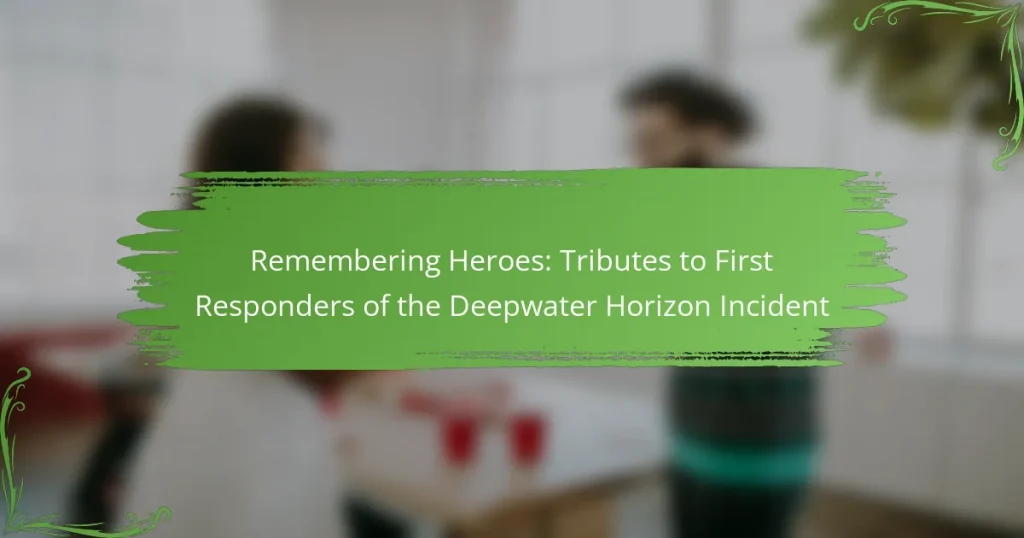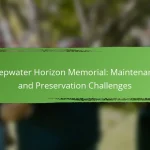The article focuses on the tributes and recognition of first responders involved in the Deepwater Horizon incident, which occurred on April 20, 2010, resulting in a catastrophic oil spill that released approximately 4.9 million barrels of oil into the Gulf of Mexico. It highlights the bravery and sacrifice of the first responders, including memorial services, statues, and annual remembrance events organized to honor their contributions. Additionally, the article discusses the lasting impacts on first responders, including physical health issues and psychological effects such as PTSD, emphasizing the importance of ongoing health monitoring and support programs for those affected. The content underscores the critical role of first responders during the crisis and the community’s efforts to acknowledge their sacrifices.
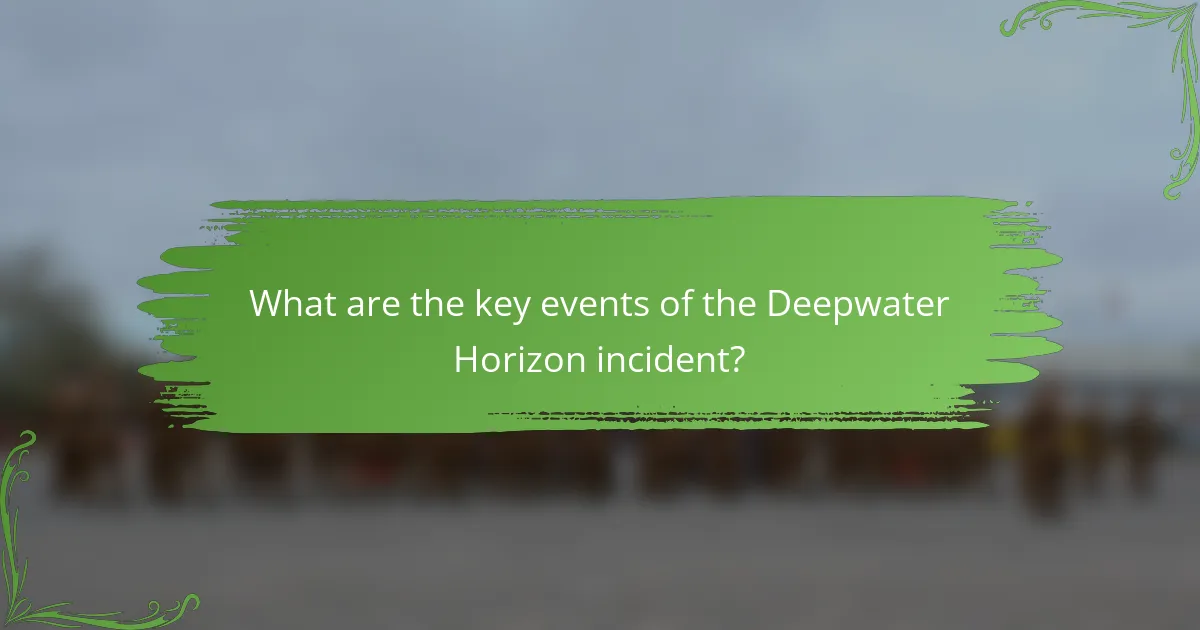
What are the key events of the Deepwater Horizon incident?
On April 20, 2010, the Deepwater Horizon drilling rig experienced a blowout. This blowout led to a catastrophic explosion and fire on the rig. Eleven crew members lost their lives in the incident. The rig sank two days later, on April 22, 2010. Following the explosion, oil began leaking from the wellhead on the seabed. The leak continued for 87 days, releasing approximately 4.9 million barrels of oil into the Gulf of Mexico. Efforts to contain the spill included the use of containment domes and controlled burns. The incident resulted in significant environmental and economic damage, prompting widespread response and recovery efforts.
How did the Deepwater Horizon disaster unfold?
The Deepwater Horizon disaster unfolded on April 20, 2010. The offshore drilling rig, operated by Transocean and owned by BP, experienced a blowout. This blowout resulted from a surge of natural gas that ignited. The explosion killed 11 crew members and injured 17 others. Following the explosion, the rig sank two days later. This incident led to one of the largest oil spills in history. Approximately 4.9 million barrels of oil leaked into the Gulf of Mexico. The disaster prompted extensive environmental and economic damage, affecting local communities and wildlife.
What were the immediate impacts of the incident on first responders?
The immediate impacts of the Deepwater Horizon incident on first responders included physical and psychological stress. First responders faced hazardous conditions, including exposure to toxic substances. Many reported respiratory issues and skin irritations due to the oil spill. The psychological toll was significant, with responders experiencing anxiety and post-traumatic stress symptoms. Reports indicated that 30% of responders showed signs of mental health challenges shortly after the incident. The demanding nature of their work during the crisis led to fatigue and burnout. These factors contributed to long-term health concerns for many involved.
Who were the first responders involved in the Deepwater Horizon incident?
The first responders involved in the Deepwater Horizon incident included the U.S. Coast Guard, local fire departments, and BP’s own response teams. The U.S. Coast Guard played a crucial role in search and rescue operations. Local fire departments assisted in firefighting efforts on the rig. BP’s response teams coordinated the initial containment and mitigation strategies. These responders worked under extreme conditions following the explosion on April 20, 2010. Their efforts were vital in managing the immediate aftermath of the disaster. The collaboration among these groups highlighted the importance of emergency response in maritime incidents.
Why is it important to remember first responders of the Deepwater Horizon incident?
It is important to remember first responders of the Deepwater Horizon incident because they played a critical role in mitigating the disaster’s impact. These individuals faced extreme risks to protect the environment and public safety. Their actions helped save lives and reduce further environmental damage. First responders worked tirelessly under hazardous conditions, showcasing bravery and dedication. Recognizing their efforts honors their sacrifices and contributions. It also raises awareness about the challenges faced by emergency personnel in similar crises. Acknowledging their service fosters a culture of appreciation for first responders. This remembrance can inspire future generations to value and support emergency services.
What sacrifices did first responders make during the crisis?
First responders made significant sacrifices during the Deepwater Horizon crisis. They risked their lives to save others from the dangers of the oil spill. Many worked long hours in hazardous conditions. First responders faced exposure to toxic substances and extreme weather. Some suffered physical injuries while performing rescue operations. Mental health impacts were also significant due to the stress of the situation. Numerous responders developed conditions like PTSD after the crisis. Their commitment to public safety often came at personal cost. These sacrifices highlight their bravery and dedication to helping others in times of need.
How did the actions of first responders influence the outcome of the incident?
The actions of first responders significantly influenced the outcome of the Deepwater Horizon incident. Their prompt response helped contain the initial fire and prevent further explosions. First responders provided critical medical assistance to injured workers, reducing fatalities. They also coordinated evacuation efforts, ensuring the safe removal of personnel from danger. The quick deployment of firefighting resources mitigated the spread of flames. Additionally, their communication with emergency services facilitated an organized response. The effectiveness of their actions was evident in the preservation of life and property. Overall, first responders played a crucial role in managing the crisis and minimizing its impact.
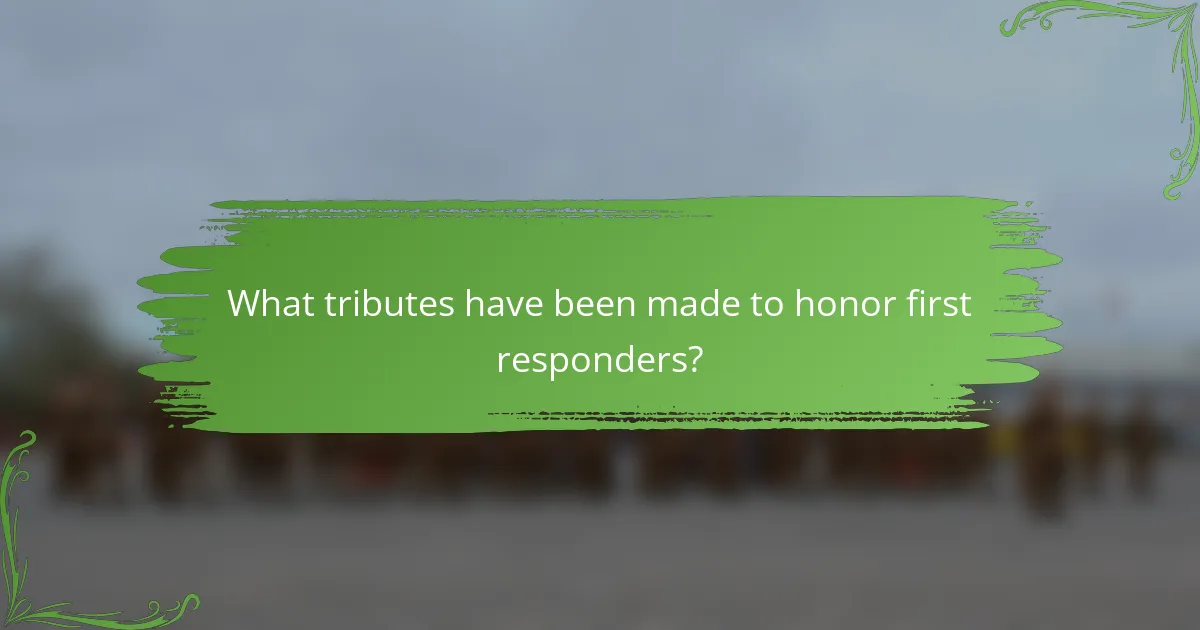
What tributes have been made to honor first responders?
Various tributes have been made to honor first responders of the Deepwater Horizon incident. Memorial services have been held to recognize their bravery and sacrifice. Statues and plaques have been erected in their memory at significant locations. The community has organized annual remembrance events to celebrate their contributions. Awards have been established to recognize outstanding service among first responders. Additionally, educational programs have been created to raise awareness about their efforts during the crisis. These tributes serve to acknowledge the critical role first responders played in the emergency response.
What types of tributes exist for first responders of the Deepwater Horizon incident?
Memorials, awards, and public recognition are the primary types of tributes for first responders of the Deepwater Horizon incident. Memorials include plaques and monuments dedicated to the responders’ bravery. Awards such as the Coast Guard Commendation Medal recognize individual acts of heroism. Public recognition occurs through ceremonies and events honoring their contributions. These tributes serve to acknowledge the sacrifices made by responders during the crisis. The Deepwater Horizon incident highlighted the critical role of first responders in emergency situations.
How have communities recognized the efforts of first responders?
Communities have recognized the efforts of first responders through various tributes and events. Memorial services have been held to honor their bravery and sacrifice. Local governments have issued proclamations acknowledging their contributions. Fundraising events have been organized to support first responders and their families. Community murals and plaques have been created to commemorate their service. Public ceremonies often include moments of silence and speeches praising their dedication. Social media campaigns have highlighted individual stories of heroism. These actions collectively reflect the communities’ gratitude and respect for first responders’ vital roles during crises.
What role do memorials play in honoring first responders?
Memorials play a crucial role in honoring first responders. They serve as physical symbols of gratitude and remembrance. Memorials provide a space for communities to gather and reflect on the sacrifices made. They help preserve the memory of those who risked their lives during emergencies. For instance, the Deepwater Horizon incident memorials commemorate the bravery of responders. These sites often include names and stories of the fallen, fostering a connection between the public and the heroes. Memorials also educate future generations about the importance of first responders. They promote a culture of respect and appreciation for those who serve.
How have first responder organizations contributed to tributes?
First responder organizations have significantly contributed to tributes by organizing memorial events and ceremonies. These events honor the bravery and sacrifices of first responders during the Deepwater Horizon incident. Organizations like fire departments and emergency medical services have participated in these tributes. They provide personnel for memorial services, ensuring that the contributions of first responders are recognized. Additionally, they often collaborate with local communities to create lasting memorials. This includes the establishment of plaques and monuments dedicated to fallen heroes. Their involvement emphasizes the importance of community support and remembrance. Through these actions, first responder organizations help maintain the legacy of those who served.
What initiatives have been launched to support first responders post-incident?
Various initiatives have been launched to support first responders post-incident. These initiatives include mental health programs, peer support networks, and financial assistance. Mental health programs aim to provide counseling and therapy for trauma-related issues. Peer support networks connect first responders with others who have experienced similar events. Financial assistance programs help cover medical bills and other expenses incurred due to the incident. These initiatives are critical for the well-being of first responders. They address both physical and mental health needs. Studies show that proactive support can significantly reduce long-term psychological distress among first responders.
How can the public participate in honoring first responders?
The public can participate in honoring first responders by attending memorial events. These events often take place on significant anniversaries or dates of remembrance. Community gatherings, parades, and ceremonies are common formats for these events. People can also contribute by volunteering for organizations that support first responders. Donations to charities that assist first responders and their families provide direct support. Creating awareness through social media campaigns can amplify the recognition of first responders’ efforts. Engaging in local initiatives, such as organizing community service projects, fosters a sense of gratitude. Additionally, writing letters of appreciation or creating art dedicated to first responders can serve as personal tributes. Each of these actions helps to acknowledge the sacrifices made by first responders.
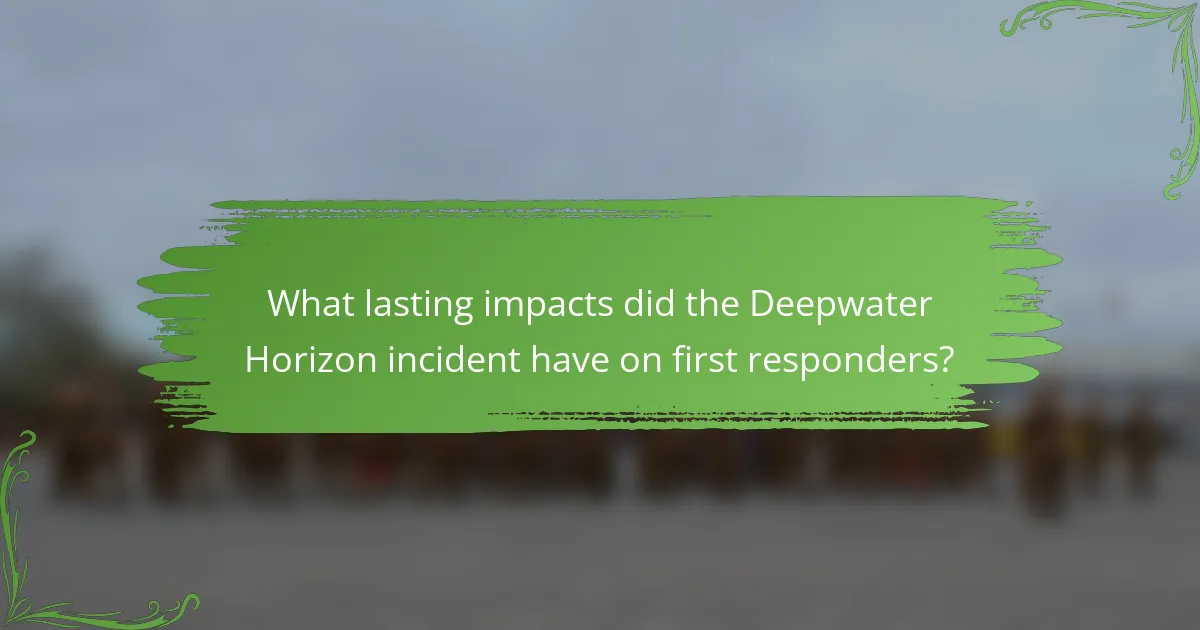
What lasting impacts did the Deepwater Horizon incident have on first responders?
The Deepwater Horizon incident had significant lasting impacts on first responders. Many first responders experienced physical health issues, including respiratory problems and skin conditions. Psychological effects such as PTSD were also prevalent among those involved. Research indicated that exposure to toxic substances during the response led to long-term health complications. A study by the National Institute for Occupational Safety and Health found that first responders reported higher rates of anxiety and depression. Additionally, the emotional toll of witnessing the disaster’s aftermath affected their mental well-being. Ongoing health monitoring and support programs have been implemented to address these impacts. These findings highlight the need for continued care and recognition of first responders’ sacrifices.
How did the incident affect the mental health of first responders?
The incident significantly impacted the mental health of first responders. Many experienced symptoms of post-traumatic stress disorder (PTSD). Studies indicate that around 30% of first responders develop PTSD after traumatic events. Anxiety and depression were also prevalent among the responders involved. The intense nature of their work during the incident contributed to these mental health challenges. Furthermore, prolonged exposure to distressing scenes exacerbated their psychological strain. Support systems were often inadequate, leading to feelings of isolation. Mental health resources became crucial for addressing these issues in the aftermath.
What resources are available for first responders dealing with trauma?
First responders dealing with trauma have access to various resources. These include peer support programs, mental health counseling, and crisis intervention services. Organizations like the National Fallen Firefighters Foundation offer support specifically for firefighters. The Substance Abuse and Mental Health Services Administration provides a national helpline for immediate assistance. Additionally, many departments have Employee Assistance Programs (EAPs) that offer confidential counseling services. Training programs on trauma-informed care are also available to equip responders with coping strategies. Research indicates that access to these resources significantly reduces the risk of PTSD among first responders.
How can communities support the ongoing needs of first responders?
Communities can support the ongoing needs of first responders by providing resources and mental health support. This includes organizing wellness programs that address stress and trauma. Communities can also facilitate access to counseling services tailored for first responders. Financial assistance programs can help cover medical expenses related to job-related injuries. Additionally, community outreach initiatives can promote awareness of first responders’ challenges. Regular public recognition events can boost morale and show appreciation. Collaborative efforts with local businesses can offer discounts or benefits to first responders. These actions can significantly enhance the well-being and effectiveness of first responders in their duties.
What lessons can be learned from the Deepwater Horizon incident regarding first responder safety?
The Deepwater Horizon incident highlights critical lessons for first responder safety. First, the importance of effective communication is paramount. During the crisis, communication breakdowns led to confusion and delayed responses. Second, proper training and preparedness are essential. First responders must be equipped to handle hazardous materials and emergency situations. Third, situational awareness is crucial. Responders need to understand the evolving nature of incidents to make informed decisions. Fourth, the need for personal protective equipment (PPE) cannot be overstated. Adequate PPE can significantly reduce risks to responders. Lastly, collaboration among agencies improves safety outcomes. Unified command structures enhance coordination and resource allocation. These lessons are vital for improving first responder safety in future incidents.
What safety protocols have been improved since the incident?
Enhanced safety protocols implemented since the Deepwater Horizon incident include stricter regulations for blowout preventers. The industry now mandates regular testing and maintenance of these critical devices. Training programs for personnel have also been intensified. Workers receive more comprehensive safety training focused on emergency response. Additionally, real-time monitoring systems have been adopted to detect potential hazards earlier. These systems improve situational awareness during drilling operations. The use of advanced technology for risk assessment has been prioritized. These improvements aim to prevent similar incidents in the future and ensure the safety of first responders and workers.
How can future incidents better prepare and protect first responders?
Future incidents can better prepare and protect first responders by implementing enhanced training programs. These programs should focus on real-life scenarios and stress management techniques. Improved communication technologies can also play a crucial role. They facilitate better coordination and information sharing among responders. Additionally, providing advanced protective gear is essential for safety. Studies show that high-quality equipment reduces injury rates among first responders. Regular psychological support and counseling services can help manage stress and trauma. Research indicates that mental health support improves overall resilience in emergency personnel. Finally, conducting post-incident reviews can identify areas for improvement and enhance future preparedness.
What practical steps can individuals take to honor first responders today?
Individuals can honor first responders today by expressing gratitude and support. Writing thank-you notes to local fire stations, police departments, or emergency medical services is a meaningful gesture. Participating in community events that celebrate first responders fosters recognition of their service. Donating to organizations that support first responders can provide essential resources. Sharing stories of heroism on social media raises awareness of their sacrifices. Attending memorial services or parades dedicated to first responders shows solidarity and respect. Volunteering for local charities that assist first responders strengthens community ties. Supporting legislation that benefits first responders ensures their needs are addressed. These actions collectively acknowledge the dedication and bravery of first responders, particularly those involved in significant incidents like the Deepwater Horizon.
The main entity of the article is the first responders of the Deepwater Horizon incident, which occurred on April 20, 2010. The article provides a comprehensive overview of the key events surrounding the disaster, the immediate and lasting impacts on first responders, and the various tributes and initiatives established to honor their sacrifices. It highlights the physical and psychological challenges faced by responders, the critical role they played in managing the crisis, and the community efforts to support and recognize their contributions. Additionally, the article discusses lessons learned and improvements in safety protocols to better protect first responders in future incidents.
